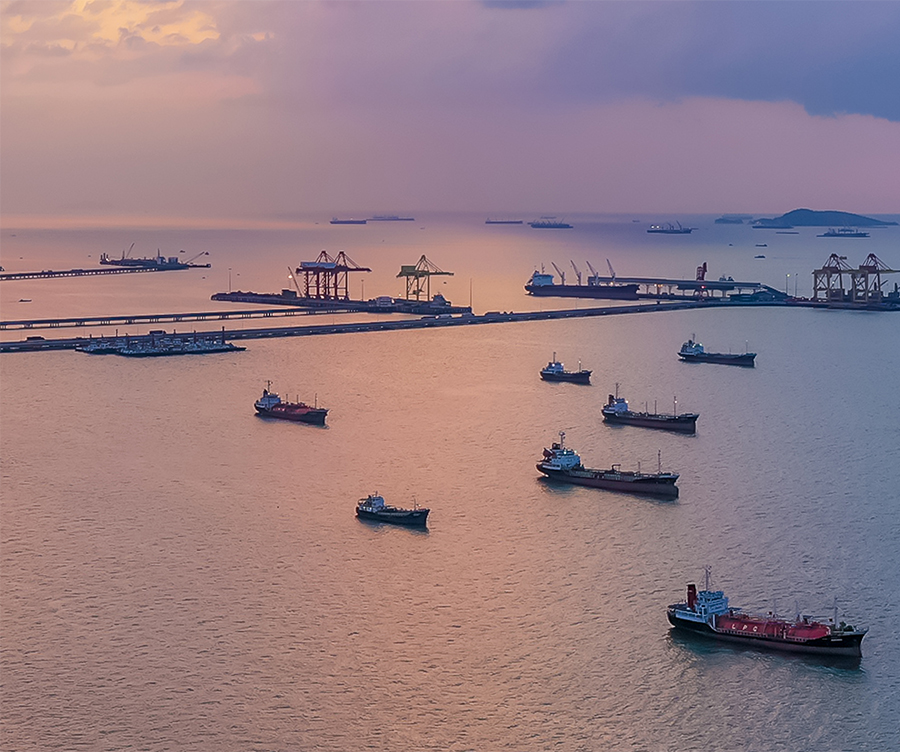International concerns are growing over the trade dispute between Australia and China, as it emerges that at least 20 cargo ships carrying Australian coal have spent weeks anchored offshore, unable to dock.
Though there has been no public announcement from Beijing, it has been widely reported that Chinese companies are under instruction to halt the purchase of coal from Australia – the latest escalation in a months-long diplomatic row between the two nations.
As a result, more than two million tonnes of coal from Australia is now stuck aboard vessels unable to deliver to the port of Jingtang in China. According to analysis by Bloomberg, IHS Markit and Global Ports, 15 giant bulk carriers have been waiting since June, and another five for at least a month.
As of November 18, each of the 20 vessels identified were still reporting their location as anchored offshore near Jingtang, according to GTR analysis of MarineTraffic data.
The stand-off follows similar unofficial restrictions imposed by Chinese authorities on Australian imports.
In May, China imposed an 80% tariff on barley imports from Australia and an outright ban on beef imports from four major producers, citing compliance issues. The decision was seen as a major blow to Australia’s agricultural industry.
In August, that impact spread to Australian wine producers after China launched an anti-dumping investigation into imported containers, a move the country’s trade minister Simon Birmingham described as “deeply troubling, concerning and perplexing”.
Since then, restrictions of various kinds have been reportedly extended to a range of hard and soft commodities, including copper, sugar, lobsters and timber.
In the cotton sector, a joint November statement from two Australian trade associations said it is “clear to our industry that the Development Reform Commission in China has recently been discouraging their country’s spinning mills from using Australian cotton”.
China’s foreign ministry spokesman, Wang Wenbin, says the reasons for the “difficult relationship between China and Australia are very clear”.
“For some time now, Australia has been blatantly violating usual diplomatic practices in international relations and has made inflammatory comments on China’s domestic matters relating to Hong Kong, Xinjiang, and Taiwan repeatedly,” he told a press conference earlier this month.
“Some people in Australia have slandered, accused China, and politicised the relationship without evidence. These actions have severely damaged mutual trust between the two countries, poisoned bilateral relations, and undermined the principles of Sino-Australian cooperation.”
One flashpoint has been Australian government calls for an independent assessment of the Covid-19 outbreak, believed to have originated in late 2019 in the Chinese city of Wuhan.
International concerns
For Australian exporters and banks, and for international organisations, the escalation in tensions is worrying on several fronts.
Trade between China and Australia had been growing rapidly following a free trade agreement in effect since late 2015. Bilateral trade reached a record of around US$180bn in 2019, which at the time represented a year-on-year increase of more than 17%.
China has become Australia’s largest trading partner in terms of both goods and services, and accounts for around a quarter of its total international trade.
Though the financial sector has so far remained quiet on the issue – one source approached by GTR describes the situation as “sensitive”, and none of Australia’s big four banks agreed to comment when contacted – trade finance experts say the stand-off over coal shipments could have a knock-on effect on banks.
“There could be an issue if bulk shipments are stranded,” says Eric Chen, a director at Singapore-based fintech vCargo Cloud. “For example, a bank may have helped the supplier by issuing an import letter of credit or paying for the purchase of the cargo to be sold to China.
“Now, due to the import restrictions, the cargo cannot be discharged into China and so the buyer cannot take the delivery and make payment. That is going to be a problem for a bank caught in that situation.”
Chen tells GTR the situation is theoretically more straightforward for containerised shipments, rather than bulk, because it is cheaper to pay for the storage of underlying goods before diverting them to another destination.
“The demurrage involved and diversion of bulk shipments is very much costlier and logistically challenging,” he says.
Another issue is around the welfare of the crews aboard those 20 bulk carriers.
The International Transport Workers’ Federation (ITF) recently issued a statement about one ship, the Jag Anand, which had been due to dock in China in mid-June but remains anchored in the Bohai Sea.
Its 23-man crew is “in need of urgent relief and are mentally and physically exhausted due to an unprecedented prolonged stay on board”, the ITF says, adding that some have been serving continuously for nearly 20 months.
The International Maritime Organization has this week announced its crisis action team is aware of the issue and is “involved at a diplomatic level to help resolve these cases”.
Australian trade minister Birmingham says: “We would urge Chinese authorities together with the shipping company and the company whose product is onboard to work together to find a resolution to this issue.”







